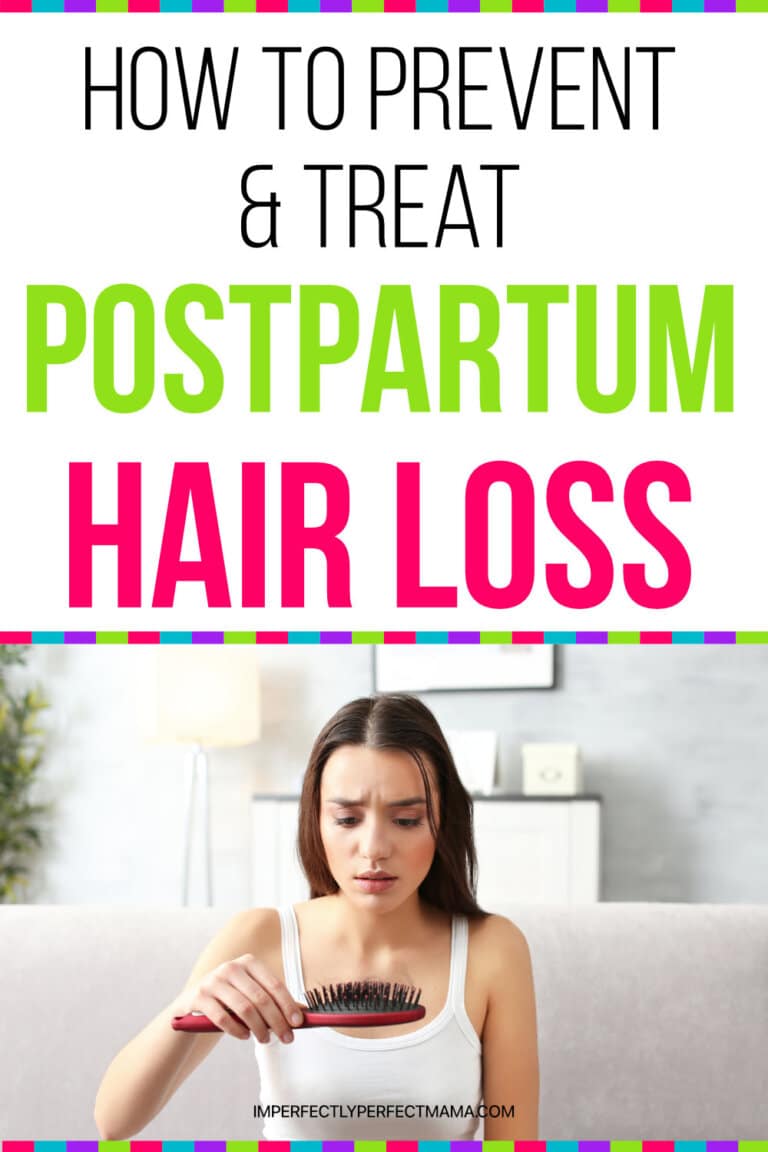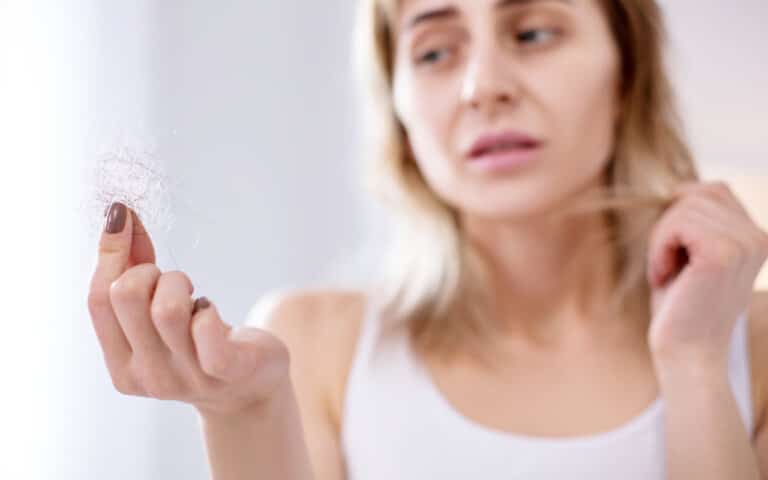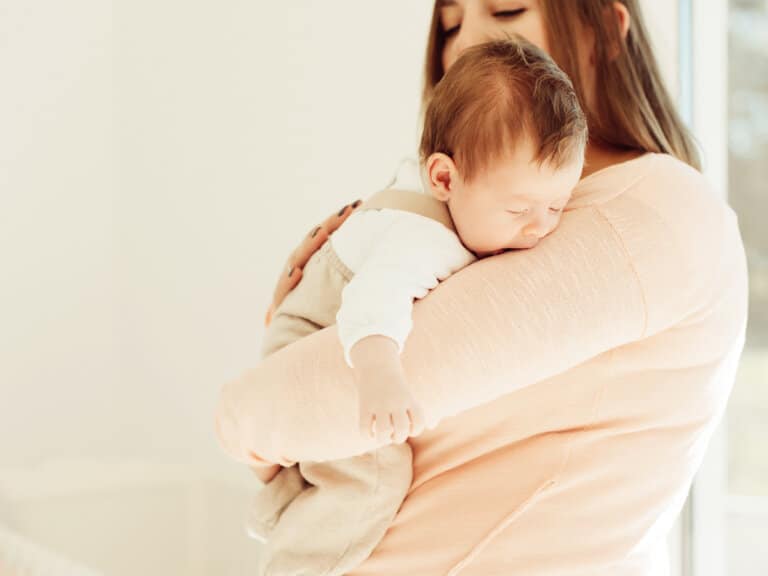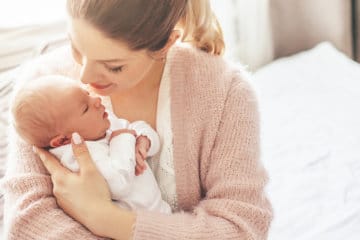Why is my hair beginning to fall out?

If you are wondering why your hair is falling out after the thick glowing hair you had during pregnancy, you have come to the right place.
It happens to many women in the postpartum period and you are one step closer to looking amazing postpartum.
Postpartum hair loss is just one of the many problems that can occur after birth. Luckily there are ways to prevent postpartum hair loss.
Soon you will be the vibrant woman you were once before.
You just need to make a few changes to get your physical and mental health great again!
In this post, the following will be discussed.:
- What is postpartum hair loss?
- What causes postpartum hair loss?
- How to prevent and treat postpartum hair loss
What Is Postpartum Hair Loss?

It is important to know that everyone loses hair every day.
It is normal to lose fifty to a hundred strands a day. That is because about 90 percent of your hair is growing at every moment and about 10 percent is waiting to be shed. If you are losing a lot more than 100 strands a day, you may be having excessive hair loss from minor to severe.
This occurs to many women after birth or in other words during their postpartum period.
Postpartum hair loss is very common three months after birth, but it can begin a little before or after that time period. I personally began losing my hair four months after delivery.
It can last for three months or more for several reasons. Finding the cause of hair loss will tell you how to solve it!
But, keep in mind, postpartum hair loss happens to many women and it is usually not long-lasting. It should be resolved within six months.
You should see that your hair grew back to normal by your baby’s first birthday. If it hasn’t, you should see a doctor.
Fun Fact: Breastfeeding does not cause hair loss
What Causes Postpartum Hair Loss?
There are several reasons you could have postpartum hair loss.
The most common reason is a change in hormonal levels.
When a woman is pregnant, the hormones progesterone and estrogen are at very high levels keeping the hair in the growth stage.
Once a woman delivers her baby, the levels of hormones decrease making the hair enter the resting stage. This is the main cause of normal postpartum hair loss.
It should resolve within 6 months.
Hypothyroidism is also known as an underactive thyroid. The thyroid releases a certain amount of hormones.
When it does not work well, the hormone levels are not normal and this may cause excessive hair loss. See a doctor if you suspect this is the cause or if you are losing too much over a long period of time.
How To Prevent and Treat Postpartum Hair Loss

1. Take Postpartum Hair Loss Vitamins
There are many found online. But, the most important factor to keep in mind is to look at the ingredients and see if vitamin C, iron, biotin, and Vitamin E are found.
Those are important for hair growth. Antioxidants in general are really good for the hair.
Tip: Just continue taking your prenatal or postnatal after birth. It will help you avoid anemia which could contribute to your hair loss. It will also make you feel healthier, stronger, and at your best!
2. Eat Healthier
Practicing healthy habits like eating healthy and exercising is great in boosting your immune system and supporting hair growth.
I know that you are busy and you are probably losing it trying to get your baby on a schedule, but staying healthy is important.
There are actually certain foods that help make the hair thicker and stronger.
Some of these foods include fruits, eggs, nuts, beans, and other foods high in vitamin A, vitamin C, and vitamin E. Fatty fish and greens are also great for the hair.
Here are some of the many foods you should be adding to your diet:
- Salmon
- Tuna
- Eggs
- Spinach
- Kale
- Berries
- Cherries
- Grapes
- Oranges
- Walnuts
- Almonds
- Chia Seeds
3. Cut Your Hair
Did you know that the shorter your hair is, the stronger it is? Shorter strands are much stronger than the longer ones making it harder for them to fall out.
It could also make your hair look fuller. If you like your long hair and will never cut it short (like me), you can simply trim it.
Any amount of trim will help.
Also, there are many shampoos that add volume to your hair. Mousse is great for volume too!
Tip: Avoid conditioner. It can make your hair look thinner.
4. Apply Organic Oils
There are so many oils that help in hair care. Applying oil to your hair twice a week is a very good habit. Here are some examples of oils you can apply to the hair and how they help your hair.
Almond oil moisturizes the scalp and helps your hair grow. Coconut oil removes dandruff from hair and helps prevent hair breakage.
Moreover, Olive oil protects your hair from heat and clears out dandruff too. This oil can be found in any kitchen. So, get up and apply the oil hair mask.
5. Skip Things That Cause Damage to Hair
Try not to style your hair too much. Heat and coloring can cause damage to hair when it is healthy. Imagine what it can do to hair when it is already falling out.
Embrace your natural hair and use products like anti-frizz and mousse to control it.
In Conclusion
Postpartum hair loss is very common and normal three months after delivering the baby. It should be gone within 6 months or by your baby’s first birthday.
If it isn’t, you should try talking to your doctor about it.
There may be another cause for this hair loss other than hormonal changes. It doesn’t hurt to try these natural ways to overcome postpartum hair loss.
Get up and start taking control of your hair now! Before you know it, your hair and health will be back to normal.




Leave a Reply